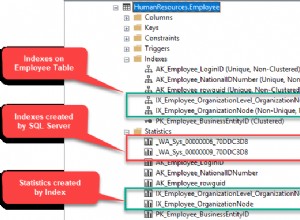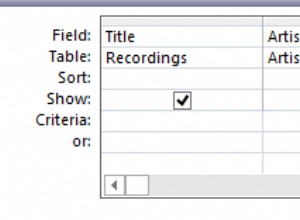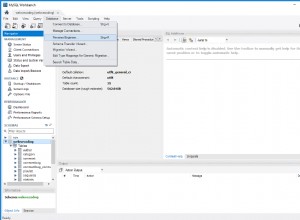Zmodyfikowałem powyższą wersję, aby działała dla wszystkich tabel i obsługiwała nowe typy danych SQL 2005. Zachowuje również nazwy kluczy podstawowych. Działa tylko w SQL 2005 (z zastosowaniem krzyża).
select 'create table [' + so.name + '] (' + o.list + ')' + CASE WHEN tc.Constraint_Name IS NULL THEN '' ELSE 'ALTER TABLE ' + so.Name + ' ADD CONSTRAINT ' + tc.Constraint_Name + ' PRIMARY KEY ' + ' (' + LEFT(j.List, Len(j.List)-1) + ')' END
from sysobjects so
cross apply
(SELECT
' ['+column_name+'] ' +
data_type + case data_type
when 'sql_variant' then ''
when 'text' then ''
when 'ntext' then ''
when 'xml' then ''
when 'decimal' then '(' + cast(numeric_precision as varchar) + ', ' + cast(numeric_scale as varchar) + ')'
else coalesce('('+case when character_maximum_length = -1 then 'MAX' else cast(character_maximum_length as varchar) end +')','') end + ' ' +
case when exists (
select id from syscolumns
where object_name(id)=so.name
and name=column_name
and columnproperty(id,name,'IsIdentity') = 1
) then
'IDENTITY(' +
cast(ident_seed(so.name) as varchar) + ',' +
cast(ident_incr(so.name) as varchar) + ')'
else ''
end + ' ' +
(case when UPPER(IS_NULLABLE) = 'NO' then 'NOT ' else '' end ) + 'NULL ' +
case when information_schema.columns.COLUMN_DEFAULT IS NOT NULL THEN 'DEFAULT '+ information_schema.columns.COLUMN_DEFAULT ELSE '' END + ', '
from information_schema.columns where table_name = so.name
order by ordinal_position
FOR XML PATH('')) o (list)
left join
information_schema.table_constraints tc
on tc.Table_name = so.Name
AND tc.Constraint_Type = 'PRIMARY KEY'
cross apply
(select '[' + Column_Name + '], '
FROM information_schema.key_column_usage kcu
WHERE kcu.Constraint_Name = tc.Constraint_Name
ORDER BY
ORDINAL_POSITION
FOR XML PATH('')) j (list)
where xtype = 'U'
AND name NOT IN ('dtproperties')
Aktualizacja: Dodano obsługę typu danych XML
Aktualizacja 2: Naprawiono przypadki, gdy 1) istnieje wiele tabel o tej samej nazwie, ale z różnymi schematami, 2) istnieje wiele tabel z ograniczeniem PK o tej samej nazwie




